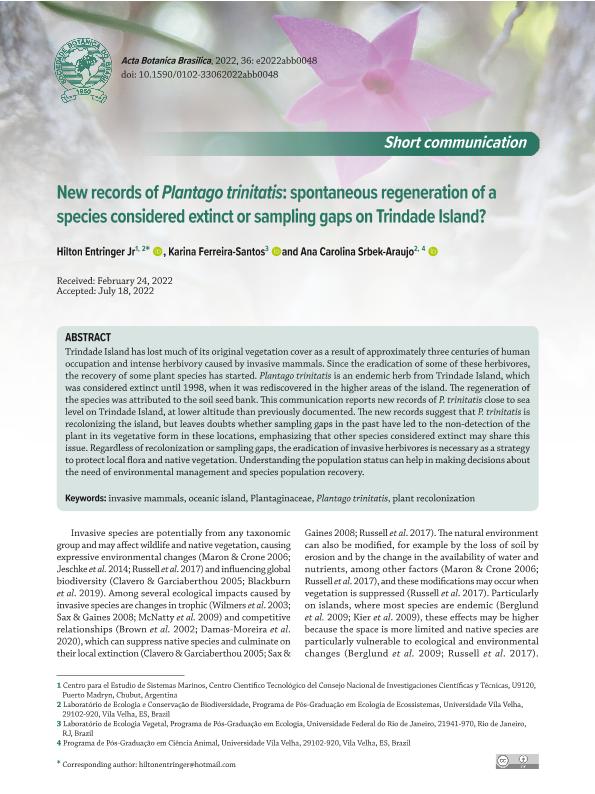Artículo
New records of Plantago trinitatis: spontaneous regeneration of a species considered extinct or sampling gaps on Trindade Island?
Fecha de publicación:
11/2022
Editorial:
Sociedade Botanica do Brasil
Revista:
Acta Botanica Brasilica
ISSN:
0102-3306
e-ISSN:
1677-941X
Idioma:
Inglés
Tipo de recurso:
Artículo publicado
Clasificación temática:
Resumen
Trindade Island has lost much of its original vegetation cover as a result of approximately three centuries of human occupation and intense herbivory caused by invasive mammals. Since the eradication of some of these herbivores, the recovery of some plant species has started. Plantago trinitatis is an endemic herb from Trindade Island, which was considered extinct until 1998, when it was rediscovered in the higher areas of the island. The regeneration of the species was attributed to the soil seed bank. This communication reports new records of P. trinitatis close to sea level on Trindade Island, at lower altitude than previously documented. The new records suggest that P. trinitatis is recolonizing the island, but leaves doubts whether sampling gaps in the past have led to the non-detection of the plant in its vegetative form in these locations, emphasizing that other species considered extinct may share this issue. Regardless of recolonization or sampling gaps, the eradication of invasive herbivores is necessary as a strategy to protect local flora and native vegetation. Understanding the population status can help in making decisions about the need of environmental management and species population recovery.
Archivos asociados
Licencia
Identificadores
Colecciones
Articulos(CESIMAR)
Articulos de CENTRO PARA EL ESTUDIO DE SISTEMAS MARINOS
Articulos de CENTRO PARA EL ESTUDIO DE SISTEMAS MARINOS
Citación
Entringer Júnior, Hilton; Ferreira-Santos, Karina; Srbek Araujo, Ana Carolina; New records of Plantago trinitatis: spontaneous regeneration of a species considered extinct or sampling gaps on Trindade Island?; Sociedade Botanica do Brasil; Acta Botanica Brasilica; 36; 11-2022; 1-6
Compartir
Altmétricas




